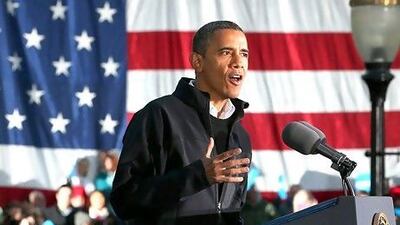When Barack Obama was elected president of the United States four years ago he was catapulted to the helm of an economy in the throes of recession and fast dragging the rest of the world with it.
Now, as American voters go to the polls again tomorrow to choose between Mr Obama, a Democrat, or his Republican challenger Mitt Romney, the stakes are no less daunting for the victor - and speed of action will be of the essence.
Investors are looking for decisive leadership strong enough to help shake off the lingering effects of the bruising financial crisis.
Markets are also expecting quick action in dealing with the looming so-called fiscal cliff - a combination of tax increases and spending cuts due to kick in at the start of next year unless political agreement can be reached on the fiscal outlook.
For the GCC, the election outcome also stands to be significant. Whoever is elected could, indirectly, have an influence on oil prices, investment flows to the region and much else.
"The election comes at a time whenever who is elected will have to move fast to minimise risks," says Tim Fox, the chief economist of Emirates NBD.
Under Mr Obama's stewardship, the US has ratcheted up spending to try to stimulate the economy. While unemployment has slowly declined from 9.6 per cent in 2010 to 7.9 per cent today, the national debt has spiralled to more than US$16 trillion (Dh58.76tn).
Whoever wins tomorrow will have to help push through a deal to avoid the looming fiscal cliff and raise the debt ceiling by the end of the year. Many economists expect fresh jitters in financial markets before a last-gasp breakthrough is found.
The Swiss bank UBS envisages up to $4tn in deficit reduction to be trimmed from the budget over the next decade under an Obama victory, comprising a 3-to-1 ratio of spending cuts to revenue.
A Republican victory would probably mean a similar package, but spending cuts would exceed revenue increases by a ratio of 4 to 1.
If a deal is not reached, the consequences could be dire. Under such a scenario, the US economy could shrink by 0.5 per cent next year, the congressional budget office estimates. But the shock waves could be felt further afield, too.
The US fiscal cliff is one of the key risks facing the global economy, says Farouk Soussa, the chief economist of Citigroup for the Middle East and North Africa region.
"If it does bite severely, it will mean a slowdown in global growth and China that will leave oil prices well below $80 [a barrel]," he says. "Once oil prices start to weaken then Opec countries would pull back [output], raising break-even oil prices, and that's the key risk."
The election outcome will also have a global impact in other ways. Mr Obama has promised to boost US manufacturing, grow small businesses and strengthen financial regulations, if re-elected. Most observers expect him to pursue a similar foreign policy approach to that of his first term.
In contrast, Mr Romney has vowed to cut regulations, boost trade and take a firmer line against Iran. Tougher action against that country could stoke tensions in the region, pushing up oil prices, says Mr Soussa. Prices surged at the turn of the year after Iran threatened to choke the supply of crude shipments by closing the Strait of Hormuz.
But victory for Mr Romney would probably mean a positive medium-term outlook for both the US economy and stocks, UBS believes.
"A mildly more optimistic intermediate-term GDP growth expectation, coupled with incrementally greater policy clarity under Romney, may be more friendly for equity markets," UBS analysts wrote in a recent report.
Such strength could transmit to the US dollar. A win for Mr Romney is likely to give the dollar a big lift, says Jens Nordvig, the head of fixed-income research in the Americas at Nomura Securities.
A stronger dollar would have implications for GCC currencies, five of which are pegged to the greenback through fixed exchange rates.
"It's usually a dampener for inflation risks," says Mr Fox. Dollar strength can help to moderate the cost of importing food and other goods to the region.
Mr Romney's pledge to replace Ben Bernanke, the central bank chairman, when his term in office expires in January 2014 may also serve to strengthen the dollar. Mr Romney has made it clear he wants someone more hawkish at the helm.
Under Mr Bernanke, the Federal Reserve has printed trillions of dollars in an effort to bolster the economy. The policy has helped to support equity markets but has pushed the dollar lower.
Another term for Mr Obama will allow the Fed to continue with its ultra-loose monetary policies. The central bank has promised to keep interest rates near zero until at least mid-2015.
A Republican-backed chairman may make an earlier rate increase more likely, to keep inflation at bay.
"We don't expect a tightening of interest rates in the near future but if do we see a change then that would be one of the key risks for this region," says Mr Soussa.
"A rise in dollar rates would mean the wall of money into this region over the last 10 years in search of yields would reverse."
Despite the contrast in visions between the two candidates, however, the difference between what each will be able to achieve as president may not be so great.
Whoever is elected will have to stimulate a slow-growth economy and push through painful austerity measures, all the while fighting a closely divided Senate to make or repeal ambitious reforms.

